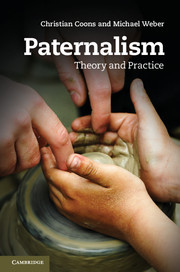Book contents
- Frontmatter
- Contents
- Contributors
- Introduction Paternalism – Issues and trends
- Chapter 1 Defining paternalism
- Chapter 2 Penal paternalism
- Chapter 3 Self-sovereignty and paternalism
- Chapter 4 The right to autonomy and the justification of hard paternalism
- Chapter 5 Moral environmentalism
- Chapter 6 Kantian paternalism and suicide intervention
- Chapter 7 Paternalism and the principle of fairness
- Chapter 8 Paternalism in economics
- Chapter 9 Choice Architecture: A mechanism for improving decisions while preserving liberty?
- Chapter 10 A psychological defense of paternalism
- Chapter 11 Libertarian paternalism, utilitarianism, and justice
- Chapter 12 Voluntary enslavement
- Chapter 13 Paternalism, (school) choice, and opportunity
- Bibliography
- Index
Chapter 5 - Moral environmentalism
Published online by Cambridge University Press: 05 February 2013
- Frontmatter
- Contents
- Contributors
- Introduction Paternalism – Issues and trends
- Chapter 1 Defining paternalism
- Chapter 2 Penal paternalism
- Chapter 3 Self-sovereignty and paternalism
- Chapter 4 The right to autonomy and the justification of hard paternalism
- Chapter 5 Moral environmentalism
- Chapter 6 Kantian paternalism and suicide intervention
- Chapter 7 Paternalism and the principle of fairness
- Chapter 8 Paternalism in economics
- Chapter 9 Choice Architecture: A mechanism for improving decisions while preserving liberty?
- Chapter 10 A psychological defense of paternalism
- Chapter 11 Libertarian paternalism, utilitarianism, and justice
- Chapter 12 Voluntary enslavement
- Chapter 13 Paternalism, (school) choice, and opportunity
- Bibliography
- Index
Summary
Writing in 1991, and discussing the political climate of the United States, Thomas Nagel made the following observations:
There is renewed hostility to homosexuals, and to pornography. Such feelings also play a part in the opposition to the right to abortion, which is closely connected with the opposition to sexual freedom, particularly the sexual freedom of women.
He continued:
While I do not sympathize with the ideals behind this moral environmentalism, it must be recognized that given their values the conservatives do have a genuine interest here, since extensive individual liberty in sexual matters, creates an emotional and cultural climate in which their preferred forms of sexual life are more difficult to maintain and to inculcate in their children.
My purpose is not to defend the conservative ideals that Nagel did not sympathize with. This is not an essay on sexual morality. But I do wish to defend the general practice of moral environmentalism that Nagel’s remarks invite us to consider; or to put it more accurately, I wish to defend one understanding of that practice from what I take to be the most important objection raised against it. This objection appeals to the value of personal autonomy.
Keywords
- Type
- Chapter
- Information
- PaternalismTheory and Practice, pp. 93 - 114Publisher: Cambridge University PressPrint publication year: 2013
- 20
- Cited by

